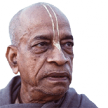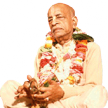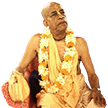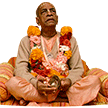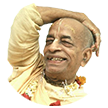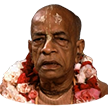Madhavendra Puri - a glorious personality: Difference between revisions
(Created page with "Category:Glorious Personalities Category:Glorious Personalities from Srimad Bhagavatam Category:Glorious Personalities from Sri Caitanya Caritamrta Category:Glor...") |
No edit summary |
||
| Line 9: | Line 9: | ||
{{Personalitiesnav}} | {{Personalitiesnav}} | ||
<!----------------- BEGIN STANDARD HEADING -----------------> | <!----------------- BEGIN STANDARD HEADING -----------------> | ||
Srila Prabhupada's books, lectures, conversations and letters reveal the qualities of this glorious personality as seen in the Vaniquotes '''[[Vaniquotes:Category: | Srila Prabhupada's books, lectures, conversations and letters reveal the qualities of this glorious personality as seen in the Vaniquotes '''[[Vaniquotes:Category:Madhavendra Puri|Madhavendra Puri]]''' category. An introduction from his teachings is given below in the following 8 quotes. | ||
<!----------------- END STANDARD HEADING -----------------> | <!----------------- END STANDARD HEADING -----------------> | ||
---- | ---- | ||
== Quotes from Srila Prabhupada's teachings == | == Quotes from Srila Prabhupada's teachings == | ||
<!----------------- edit quote boxes below this line -----------------> | <!----------------- edit quote boxes below this line -----------------> | ||
{{VaniQuotebox| | {{VaniQuotebox|Madhavendra Puri had two principal disciples, Isvara Puri and Sri Advaita Prabhu|Śrī Mādhavendra Purī is one of the ācāryas in the disciplic succession from Madhvācārya. Mādhavendra Purī had two principal disciples, Īśvara Purī and Śrī Advaita Prabhu. Therefore the Gauḍīya Vaiṣṇava-sampradāya is a disciplic succession from Madhvācārya. This fact has been accepted in the authorized books known as Gaura-gaṇoddeśa-dīpikā and Prameya-ratnāvalī, as well as by Gopāla Guru Gosvāmī. '''(Caitanya-caritāmṛta, Antya-līlā 6.40)'''}} | ||
{{VaniQuotebox| | {{VaniQuotebox|Madhavendra Puri understood Ramacandra Puri's position as a great fool and therefore immediately rebuked him. Such a reprimand from the spiritual master is certainly for the betterment of the disciple|Rāmacandra Purī was not sufficiently expert to understand the feelings of Mādhavendra Purī, but nevertheless he thought himself very advanced. Therefore, regarding Mādhavendra Purī’s expressions as ordinary material lamentation, he advised him to remember Brahman because he was latently an impersonalist. Mādhavendra Purī understood Rāmacandra Purī’s position as a great fool and therefore immediately rebuked him. Such a reprimand from the spiritual master is certainly for the betterment of the disciple. '''(Caitanya-caritāmṛta, Antya-līlā 8.22)'''}} | ||
{{VaniQuotebox| | {{VaniQuotebox|Madhavendra Puri's community|Śrī Caitanya Mahāprabhu accepted lunch cooked by a Sanoḍiyā brāhmaṇa simply because he belonged to Mādhavendra Purī’s community. Śrīla Mādhavendra Purī was the spiritual master of Īśvara Purī, who was the spiritual master of Śrī Caitanya Mahāprabhu. Thus a spiritual relationship is established on the spiritual platform, without consideration of material inferiority or superiority. '''(Caitanya-caritāmṛta, Madhya-līlā 17.179)'''}} | ||
{{VaniQuotebox| | {{VaniQuotebox|Madhavendra Puri, the king of Vaisnavas, bore his reputation, but he wanted to keep himself outside of the vision of the general populace|Mādhavendra Purī, the king of Vaiṣṇavas, bore his reputation, but he wanted to keep himself outside of the vision of the general populace. He wanted to cover his real identity as a great devotee of the Lord, but when people saw him overwhelmed in the ecstasy of love of Godhead, they naturally gave credit to him. '''(Caitanya-caritāmṛta, Madhya-līlā 4.147)'''}} | ||
{{VaniQuotebox| | {{VaniQuotebox|Out of the four sampradayas, the Sri Madhvacarya-sampradaya was accepted by Madhavendra Puri. Thus he took sannyasa according to parampara, the disciplic succession|The uncontaminated devotees who strictly depend on the Vedānta philosophy are divided into four sampradāyas, or transcendental parties. Out of the four sampradāyas, the Śrī Madhvācārya-sampradāya was accepted by Mādhavendra Purī. Thus he took sannyāsa according to paramparā, the disciplic succession. Beginning from Madhvācārya down to the spiritual master of Mādhavendra Purī, the ācārya named Lakṣmīpati, there was no realization of devotional service in conjugal love. '''(Caitanya-caritāmṛta, Madhya-līlā 4.197)'''}} | ||
{{VaniQuotebox| | {{VaniQuotebox|Ramacandra Puri was a disciple of Madhavendra Puri|Rāmacandra Purī was one of the disciples of Mādhavendra Purī, he was influenced by dry Māyāvādīs, and therefore he criticized Mādhavendra Purī. Therefore Mādhavendra Purī accused him of being an offender and rejected him. Because Rāmacandra Purī had been rejected by his spiritual master, he became concerned only with finding faults in others and advising them according to dry Māyāvāda philosophy. '''(Caitanya-caritāmṛta, Antya-līlā 8 Summary)'''}} | ||
{{VaniQuotebox| | {{VaniQuotebox|Seeing the food uncovered before the Deity, Madhavendra Puri desired to taste a little of it so that he could prepare a similar sweet rice for his Gopala. Madhavendra Puri was so strict, however, that he considered this to be an offense|Seeing the food uncovered before the Deity, Mādhavendra Purī desired to taste a little of it so that he could prepare a similar sweet rice for his Gopāla. Mādhavendra Purī was so strict, however, that he considered this to be an offense. Consequently he left the temple without saying anything to anyone. The paramahaṁsa is therefore called vijita-ṣaḍ-guṇa. He must conquer the six material qualities—kāma, krodha, lobha, moha, matsarya and kṣudhā-tṛṣṇā (lust, anger, greed, illusion, enviousness and hunger and thirst). '''(Caitanya-caritāmṛta, Madhya-līlā 4.124)'''}} | ||
{{VaniQuotebox| | {{VaniQuotebox|Since the Deity spoke to both Madhavendra Puri and the brahmana priest in dreams, practically speaking they were on the same platform|Since the Deity spoke to both Mādhavendra Purī and the brāhmaṇa priest in dreams, practically speaking they were on the same platform. However, because Mādhavendra Purī was a senior sannyāsī Vaiṣṇava, a paramahaṁsa, the priest immediately fell flat before him and offered obeisances. '''(Caitanya-caritāmṛta, Madhya-līlā 4.135)'''}} | ||
<!----------------- edit quote boxes above this line -----------------> | <!----------------- edit quote boxes above this line -----------------> | ||
''' | '''Madhavendra Puri - [[Vaniquotes:Category:Madhavendra Puri|explore more within this category]]'''. | ||
{{GloriousPersonalitiesTotal}} | {{GloriousPersonalitiesTotal}} | ||
Latest revision as of 05:40, 22 December 2016
INTRODUCTION TEXT TO BE WRITTEN
Srila Prabhupada's books, lectures, conversations and letters reveal the qualities of this glorious personality as seen in the Vaniquotes Madhavendra Puri category. An introduction from his teachings is given below in the following 8 quotes.
Quotes from Srila Prabhupada's teachings
Madhavendra Puri - explore more within this category.
Vanipedia has now over 215 introductory articles compiled from Srila Prabhupada's teachings under the series titled Glorious Personalities. All these articles can be seen in the Table of Content on the right side of this article and also here in this Umbrella Category. Browse through them to relish the breadth and depth of Srila Prabhupada's teachings - There is an attractive personality for everyone.
